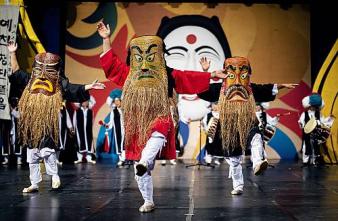EE00002508
 Talchum, mask dance drama in the Republic of Korea
Talchum, mask dance drama in the Republic of Korea
Talchum is a performing art that encompasses dance, music, and theatre. An ensemble of six to ten musicians accompanies masked performers who sing and dance and exchange verbal interactions through theatrical movements.
The primary themes satirized by traditional mask dance dramas include the hypocrisy of Buddhist monks, the arrogance of the yangban nobility, and people's suffering under the male-dominated patriarchal system. Diverse social issues are humorously explored through dramatic combinations of songs, dances, movements, and words. Masks with exaggerated archetypical representations of everyday personages are an indispensable element in the presentation of talchum.
A Korean mask dance drama does not require a formal stage: Any empty space can become a venue for talchum. The audience for a masked-dance drama are not passive spectators, but important participants. They complete the production with their cheers and jeers as the drama unfolds. Talchum is a dynamic theatrical flow of action and sound created through the combined efforts of both the players and spectators.
This flexibility provided to talchum by the audience's active participation and its thematic orientation toward social criticism gave birth to the unique phenomenon of large-scale transmission of talchum among young people, particularly university students, during the 1970-80s. This generation continues to play a critical role in the transmission of talchum.
In talchum, physical and emotional conflict among the characters always ends in a dance of reconciliation. While criticizing that which needs to be criticized, talchum always aims toward a greater unity.
Republic of Korea
2022



